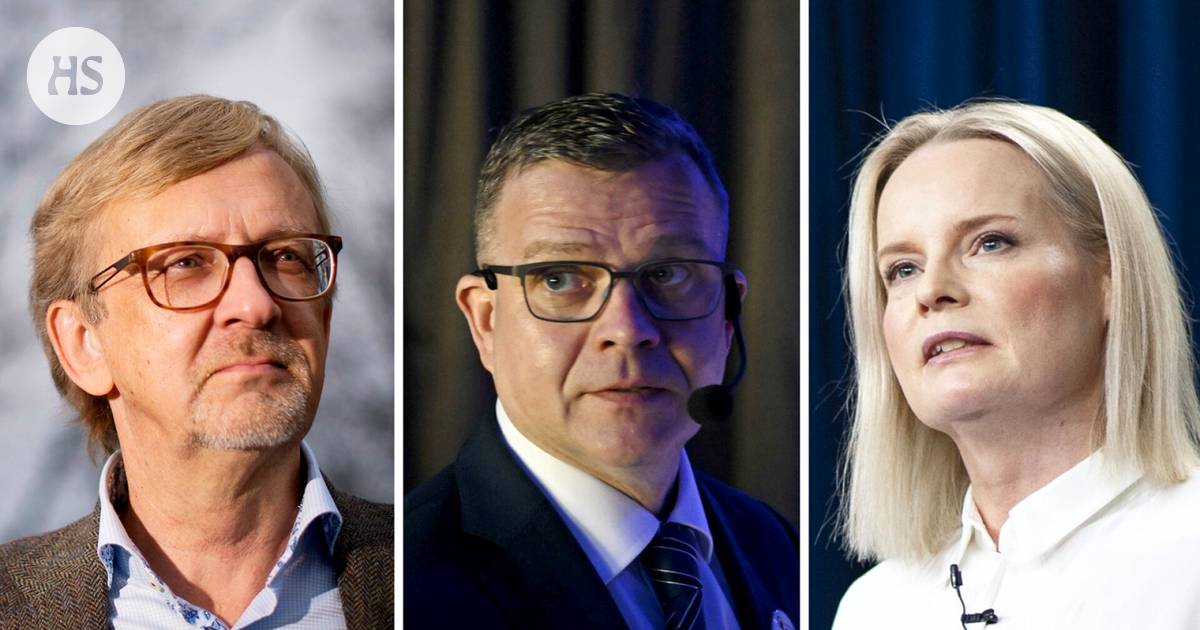The Chancellery of the Government has proposed the establishment of a new security policy advisor to the Prime Minister. In the opinion round, the project has gathered strong criticism. The professor of political science Ilkka Ruostetsaari and the opposition’s Petteri Orpo (kok) and Riikka Purra (ps), who were interviewed by HS, have a positive attitude towards the project.
The State Council in the chancellery, i.e. practically the prime minister Sanna Marini (sd) close people are still preparing a position for the prime minister’s new advisor on security policy – despite the harsh criticism.
Secretary of State Henrik Haapajärvi from the Prime Minister’s Office says that the preparation of the new office and the new security policy unit to be established around it is progressing despite the feedback from the opinion round. “At least it hasn’t come up so far that the project should be put on hold,” Haapajärvi tells HS.
The Chancellery’s aim is to get a new advisor to start working with this government. “The idea is that when the new government starts, the new prime minister would have an expert when he was brought in. We have received an allocation for salary expenses for the whole year,” says Haapajärvi.
Haapajärvi according to that, the need for a new security policy adviser was considered even before Russia’s attack on Ukraine. The position has now been prepared in the office as a temporary position, possibly lasting five years. Thus, the adviser would continue even if the government or prime minister changed.
“The idea is that continuity and the best possible expert support would be available to the prime minister,” says Haapajärvi.
Reached by HS the professor of political science and the opposition leaders from the coalition and Basic Finns are suspicious of the project.
Association leader Petteri Orpo does not see the need for a new security policy advisor in the prime minister’s cabinet. “The Constitution Committee has also assumed that NATO will go into existing structures. Constitutionally, nothing new is needed,” says Orpo.
Chairman Riikka Purra (ps) wonders about the timing of the project and how NATO membership has been offered as the only justification for the new position and unit.
“It’s not really a reason, because these matters do not per se belong to the Prime Minister’s Office, but to the relevant ministries,” says Purra.
Constitution according to which the foreign policy of Finland is led by the President of the Republic in cooperation with the Government Council. In practice, the work is done at meetings of the government’s foreign and security policy ministerial committee and the president, known by the abbreviation tp-utva.
Orpo of the coalition also considers the project to be hasty in terms of time.
“This kind of thing should not be rushed forward, but the elections should be held first and the NATO process completed. Then we can see together whether there is a need for renewal,” says Orpo.
The State Council the chancellery’s proposal starts from the fact that both a new position and a unit would be established to assist the prime minister. Orpo of the Coalition fears that the plan may increase confusion in the preparation of matters.
“The current preparation in the Ministry of Foreign Affairs and Defense before the decision-making in tp-utva has been effective. If the prime minister wants help in the area of foreign and security policy, that help can be strengthened in other ways as well,” says Orpo.
Could such a need for a new advisor arise after the elections, Petteri Orpo?
“I can’t see the need, at least until actual NATO membership and practical experience,” Orpo replies.
Also purra of basic Finns believes that the prime minister is already receiving enough aid at the moment.
“As far as I know the assistants around him, the information provided by the ministries and tp-utva,” says Purra.
“And if something else is needed, the necessary information can certainly be obtained by rationalizing the processes,” says Purra.
The Chancellery of the Government has previously asked other ministries, the President and the General Staff for statements about the new task. The attitude has been critical.
For example, the Office of the President of the Republic considered the project premature and excessive, and the Ministry of Foreign Affairs stated that the new advisor would transfer power from the ministries closer to the Prime Minister. The Ministry of Defense has not yet submitted its own statement.
State doctrine professor Ilkka Ruostetsaari The University of Tampere reminds us that questions related to the distribution of power are always politically sensitive.
“It has been speculated that by appointing a new advisor, the current government would set the mantle for the next prime minister. But this is really speculation,” Ruostetsaari says.
According to the professor, in any case, it is unclear what the need is that would be met with a new advisor. “It has not become completely clear in the discussion so far,” Ruostetsaari says.
The government of Sanna Marin can establish an office and a new unit regardless of the opinions by changing the decree from the government office. After the opinion round, the proposal goes to the board for consideration in the standard way.
Professor According to Ruostetsaari, the planned new advisor for the prime minister would strengthen the prime minister’s leadership conditions in foreign and security policy.
“But on the other hand, it could also obscure power relations,” Ruostetsaari says.
“There may be a coordination problem. The Prime Minister has at his disposal all the expertise that professional ministries in the field have, such as the Ministry of Foreign Affairs, Defense and the Interior.”
In time, Finland will send the president of the republic as a representative to the NATO meetings.
“The Constitutional Law Committee has considered that NATO membership will not change the decision-making system of foreign and security policy,” Ruostetsaari reminds.
“If a whole new unit is created, it can change the division of labor between the Prime Minister’s Office and other ministries. In this sense, the advisor’s task should be clarified,” says Ruostetsaari.
Rust Tsar estimates that the schedule for establishing the new position is in any case very busy.
In the plans of the Cabinet of Ministers, the decree would be in effect already at the beginning of March, and a new advisor would be appointed soon after. “The schedule can even be too busy,” Ruostetsaari says.
According to Ruostetsaari, the position of the prime minister as a security policy decision-maker could be strengthened even without the establishment of a separate advisory body.
“Why not go with the assistant model? Then the prime minister could appoint a security policy adviser with the title of political state secretary, for example. Why wouldn’t that model work? In that model, there would be a clearer political responsibility, i.e. responsibility to the appointer. In the pure civil servant model, there is not the same political responsibility, but civil servant responsibility”.
#Security #Policy #preparation #prime #ministers #adviser #continues #criticism #opposition #leaders #researcher #commented









